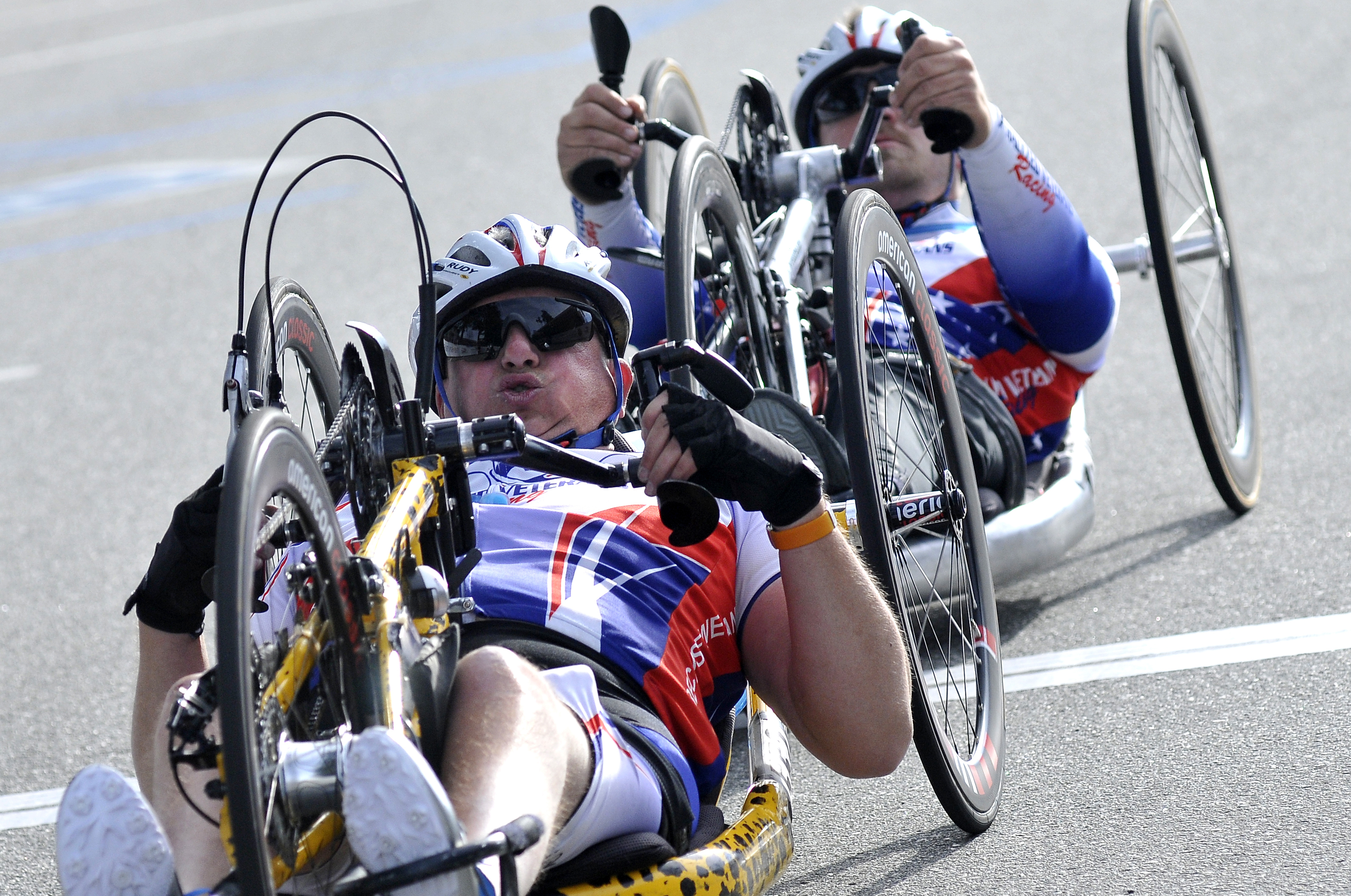This weekend's handcycling events:Saturday, 8:30 a.m.: Handcyling Time Trials, 8001 Volkwagen DriveMonday, 12:30 p.m.: Handycling Criterium National Championship, downtown Chattanooga
Jeff Snover grew up running.
In high school in Flushing, Mich., Snover ran track. During his 18 years in the Army, Snover ran during free time. He needed the action. Running keeps you healthy. Running relieves stress.
But when he awoke in October 2003, he couldn't run -- not then, not ever again. But in those moments, in a bed at Erlanger Medical Center, Snover did not think about exercise. He asked when he could return to his unit.
About seven months earlier, the 507th Maintenance Company from Fort Bliss, Texas, took a wrong turn in the desert, and members of the Iraqi military fired a rocket-propelled grenade at Snover's unit.
The grenade hit a Humvee, and the Humvee hit the back of a tractor-trailer. Eleven soldiers died. The Iraqis took six more hostage, including 19-year-old Jessica Lynch. But Snover was in a convoy ahead of that group. He was safe.
In September, he returned home on leave, and he visited property he owned in Crossville, Tenn. One day, he and his wife hoped to build a home there.
During his visit, Snover cut down a pine tree.
It tipped the wrong way.
The tree crushed Snover, collapsed his lungs and compressed his spinal cord.
After a month in a drug-induced coma, Snover awoke at Erlanger. He didn't know why he was in the hospital. He didn't know he couldn't walk, and never would again.
After about a day, he said, he began to understand what happened. But he didn't understand what it meant, not entirely. He thought all action had been stripped from his now-handicapped life, like a man tied to a couch, forced to sit and count the rest of his days.
Snover had no idea that, about 10 years later, he would compete with athletes across the country. But at 12:30 p.m. Monday, the 18-year military veteran will race through downtown Chattanooga in the Handcycling Criterium National Championship, which is in town in conjunction with the USA Cycling Professional Championships also being held this weekend.
The sport of handcycling has become more popular in recent years, said Ian Lawless, the executive director of the U.S. Handcycling Federation. In 2008, the International Cycling Union began to govern the sport, and around the same time USA Cycling included handcycling in its national championship events, such as the one unfolding here this weekend.
Lawless chalked it up to a public relations move, a chance to combat all the headlines of stripped medals and federal investigations into performance-enhancing drugs.
"The sport of cycling right now has an image problem," Lawless said. "I think that paracylcing can help the image. We have athletes with incredible stories."
The support of powerful governing bodies has led to credibility. Athletes with disabilities and able-bodied athletes race at the same events, in front of the same crowds.
When Snover started racing in 2008, he remembers events with just five competitors. Now, on average, he competes against 20 or 30 people. During the first race of the season in Melbourne, Fla., in February, 62 riders competed.
Snover began handcycling in 2004 while rehabbing at the Charlie Norwood VA Medical Center in Augusta, Ga. After about four years, though, he became tired of riding around trails. He needed races.
Now, he trains 8-16 hours per week. Race season runs from February through October. Two or three weekends a year, he travels from Florida to California to race.
"It's become a way of life for me," said Snover, who also co-founded a nonprofit called Champions Made From Adversity.
His pre-race routine begins the night before. On Sunday, he will make sure his wheels are tight and his racing number is pinned properly. He will hydrate, and he will eat pasta and potatoes.
And he will feel nervous, the whole time.
On Monday, he will arrive to the race about two hours early. He will warm up and look for new racers, people who have just joined the sport.
And he will feel excited about that. And he will feel nervous, still.
And finally, finally, a whistle will blow, and the nerves and the stress and all other day-to-day worries will slip away from him.
And he will ride.
Contact Tyler Jett at tjett@timesfreepress.com or 423-757-6476.
